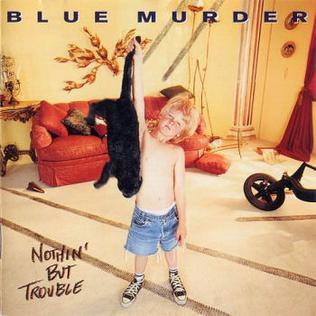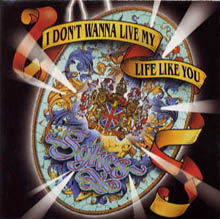
"Song 2" is a song by English rock band Blur. The song is the second song on their eponymous fifth studio album. Released physically on 7 April 1997, "Song 2" peaked at number two on the UK Singles Chart, number four on the Australian ARIA Singles Chart, It was also popular on radio stations in the US; consequently, it peaked at number 55 on the Hot 100 Airplay chart, number 6 on Billboard's Modern Rock Tracks chart, staying on that chart for 26 weeks. "Song 2" is certified triple platinum in the UK.

John James Sykes was an English guitarist, best known as a member of Whitesnake, Thin Lizzy and Tygers of Pan Tang. He also fronted the hard rock group Blue Murder and released several solo albums.

"Songbird" is a song by English rock band Oasis from their fifth studio album, Heathen Chemistry (2002), and is the first single by Oasis written by vocalist Liam Gallagher. Released on 3 February 2003, the song reached number three on the UK Singles Chart, number two on the Canadian Singles Chart, and the top 10 in Ireland and Italy. During an interview with The Matt Morgan Podcast, Liam's brother and bandmate Noel Gallagher called the track a "perfect" song.

Blue Murder is the debut album by English hard rock band Blue Murder, released on 24 April 1989 by Geffen Records. It was produced by Bob Rock. The band was formed by guitarist John Sykes after his dismissal from Whitesnake. He was eventually joined by bassist Tony Franklin and drummer Carmine Appice. The band entered Little Mountain Sound Studios in early 1988 to begin recording their debut album. After several unsuccessful attempts at finding a lead singer, John Sykes took up the role, having already sung the band's first demos. Following the record's release, Blue Murder embarked on tours supporting Bon Jovi and Billy Squier.

Slide It In is the sixth studio album by English rock band Whitesnake, released on 30 January 1984 in Europe by Liberty and EMI Records. To cater to the American market, the album was remixed and resequenced, and subsequently released on 16 April 1984 in North America through Geffen Records, after the group was signed to the label prior to its release. The album is widely regarded as a pivotal release for Whitesnake, as it marked their initial success in the United States and laid the groundwork for their breakthrough later in the 1980s. Notably, it was the last Whitesnake album to feature the band’s original "snake" logo. Two distinct editions of the album exist, each reflecting a different production approach. The original mix was criticized for its "flat" sound, while the remix adopted a more modern and polished production style, aligning with the growing popularity of the American glam metal scene. The remix proved instrumental in refining Whitesnake's sound, helping the band establish a stronger identity in the competitive U.S. rock market, giving it "the voice" that the group wanted. Critics have described the album as a blend of blues rock and glam metal. The remixed version, in particular, was praised for its energy and accessibility, which resonated with American audiences.

"Wind of Change" is a song by German rock band Scorpions, recorded for their eleventh studio album Crazy World (1990). A power ballad, it was composed and written by the band's lead singer, Klaus Meine, and produced by Keith Olsen and the band. The lyrics were composed by Meine following the band's visit to the Soviet Union at the height of perestroika, when the enmity between the communist and capitalist blocs subsided concurrently with the promulgation of large-scale socioeconomic reforms in the Soviet Union.

"Wishlist" is a song by the American rock band Pearl Jam. Written by vocalist Eddie Vedder, "Wishlist" was released on May 5, 1998, as the second single from the band's fifth studio album, Yield (1998). In the United States, the song peaked at number six on both the Billboard Mainstream Rock and Modern Rock Tracks charts. The song was included on Pearl Jam's 2004 greatest hits album, rearviewmirror .

Loveland is the second solo album by English musician John Sykes, released on 25 July 1997.

Nothin' But Trouble is the second and final studio album by hard rock band Blue Murder. Released on 31 August 1993 by Geffen Records, the album was produced by the band's vocalist-guitarist John Sykes.

Into the Light is the third solo album by English singer David Coverdale, released by EMI on 25 September 2000 in the UK, 27 September in Japan and by Dragonshed on 21 November in the US.

Nuclear Cowboy is the fourth and final solo studio album by English musician John Sykes, released on 27 October 2000. The record saw Sykes experimenting with drum loops and other elements of hip hop production.

Chapter One is a compilation album by John Sykes, released in 1998. The record features material from Sykes' solo career, as well his time with Blue Murder. The album was released by the Japanese branch of Mercury Records without Sykes' involvement.

"Please Don't Leave Me" is a song by English hard rock musician John Sykes. It was released in 1982 by MCA Records as his first solo single. It also features members of the Irish hard rock group Thin Lizzy, including frontman Phil Lynott, who co-wrote the track with Sykes.

"I Don't Wanna Live My Life Like You" is a song by English hard rock musician John Sykes. It was released in 1995 by Mercury Records' Japanese branch as the first single from his debut solo album Out of My Tree. The song was described by Sykes as having a 1970s punk rock-vibe with rebellious lyrics. Sykes jokingly stated that the song is a reflection of his own life with his neighbours.

Out of My Tree is the first solo album by English musician John Sykes, released on 21 August 1995.

Bad Boy Live! is a live album by English musician John Sykes, released on 16 December 2004. The album was recorded during a Japanese tour in April 2004. The record features songs from Sykes's solo career as well as his former bands Thin Lizzy, Whitesnake and Blue Murder. This is Sykes's final album before his death in 2024.
"Andy Warhol" is a song written by the English singer-songwriter David Bowie in 1971 for the album Hunky Dory. It is an acoustic song about one of Bowie's early artist inspirations, the American pop artist Andy Warhol.

T. Rex were an English rock band formed in London in 1967 by singer-songwriter and guitarist Marc Bolan, who was their leader, frontman and only consistent member. Though initially associated with the psychedelic folk genre, Bolan began to change the band's style towards electric rock in 1969, and shortened their name to T. Rex the following year. This development culminated in 1970 with their first significant hit single "Ride a White Swan", and the group soon became pioneers of the glam rock movement.

1987 is the seventh studio album by English rock band Whitesnake, released on 23 March 1987, by Geffen Records in the US and by EMI Records in the UK one week after. It was co-written and recorded for over a year in what would be the only collaboration between vocalist David Coverdale and guitarist John Sykes, the final album to feature original bassist Neil Murray and the only album with drummer Aynsley Dunbar. The album, besides its commercial success, is remarkable for the band's change to a more modern glam metal look and sound, and the first recording to use the band's new logo which would characterise them in the future.


















